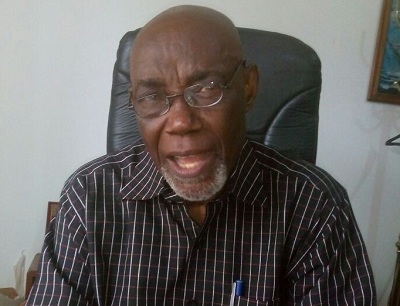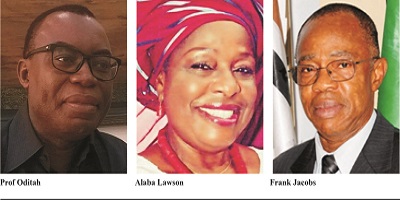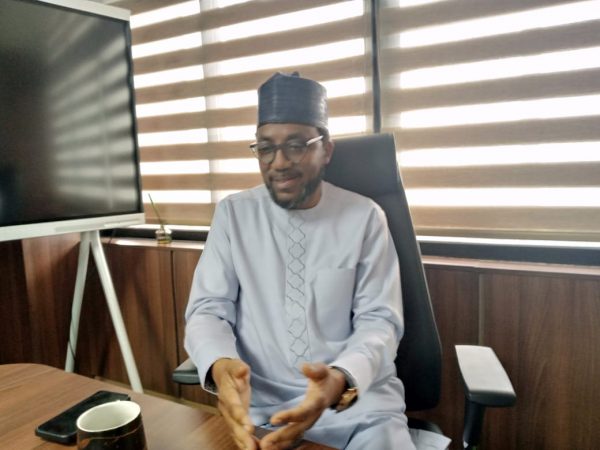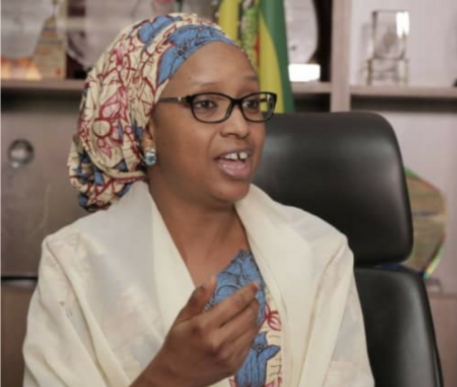How I Managed Nigerian Billionaires At Chamber Of Shipping – Ify Akerele
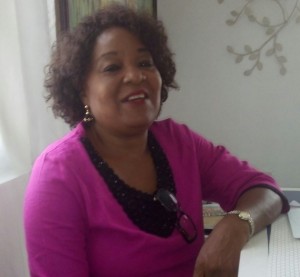
Mrs. Ifeyinwa Anazonwu-Akerele is a former Director-General of Nigerian Chamber of Shipping (NCS) and a former president of Women’s International Shipping and Trading Association (WISTA-Nigeria). In this interview culled from WISTA Journal, she explains her political journey, relationships and passion for the underprivileged.
Of course, she explains why she exited from the chamber, how she was able to manage the Nigerian billionaires in the chamber. She has the key, and what is it? As you find out the above make your day memorable with our Personality of The Months. Excerpts:
How has it been since you exited from chamber of shipping for political life?
Well, when I moved into the political arena, it was because I felt I had something to offer the maritime sector primarily, then my community.
I like community development activities. I like advocacy, I like sensitization. Anything that will improve the knowledge-base and activities within the sector is something that I find very appealing. May be, my major was Sociology and then International Relations, so you can see my love for community activities, even on the global level. That was why I passionately drove the Nigerian Chamber of Shipping (NCS) to the level it got to. I was there for 11years and I felt it was time to leave because I was able to understand all the ups and downs in the maritime sector. As an advocacy champion, I felt that from the position of power at the National Assembly, I would be able to push a lot of bills and legal focus on the areas that were neglected. I got to understand the Cabotage law and I know inside out what the industry needed to do to make sure the Cabotage law was successful because up till date it is not successful. And I believe that from the insider’s point of view I will be so bent on making it successful, if I was there. I had a lot of support from members; a lot of them gave me money for my campaign. It shows that everybody wanted one of their own there. That is what pushed me out of the Chamber, I wanted to take the relevance of the Chamber to another level, to a strong advocacy platform. I wanted a situation where when I speak at the National Assembly chamber the Chamber of Shipping will be backing what I am saying. I am still believing that I will be a voice for the sector from the parliamentary angle. I have not given up hope.
How would you describe the political family and the intrigues that go with the drama?
It is extremely complex and very immature. It is quite subjective. I wonder why some people run for office because some of them don’t have any agenda for the people that they are representing. The budget padding saga seems to reveal that a lot of them go there to fend for themselves. Not even to help their constituencies, that is why I say that it is still very immature. I had to learn to keep my mouth shut. When I ask some of them what their programme for their people are, they will tell me, “let me get in there first. I put aside N200 million in my account”. I believe God is sorting everything out. By the time I go in there, it will be difficult to live that kind of life because all eyes will be on me.
Does it worry you that we have an invasion into the maritime sector, bringing people who do not understand what the industry is all about to lead? We have them across the agencies in the industry. What is your take on this?
Politics makes sure that happens. Unfortunately, how many maritime people go into politics? So they are going to bring anybody into the sector to compensate for their hard work towards supporting a party. If they pull me in there what have I done for the party that will justify a “thank you”? Again, before I got into the maritime sector I did not have a clue of what the place was like. I was in the administrative sector, I was into international relations, research and others, but I had the ability to co-ordinate, so if they put somebody like my sister at the Nigerian Ports Authority (NPA), Hadiza Bala-Usman, she shows the ability to co-ordinate and to assimilate. She can sit down on the table with experts of each sector, and when they churn out information, she will be able to ascertain which is true or not. When I joined the Chamber, I had no clue of what the sector was like, but I educated myself. For two years, I did not speak on any issue because I did not want to say the wrong thing. I attended many courses, I exposed myself and read a lot online. After the second year, I was able to start talking, even present papers. Recall that the then National Maritime Authority (NMA) was run by an architect, I think Ferdinand Agu did very good job. Mfon Usoro is a versatile maritime lawyer and a legal practitioner. Once you have the ability in you, you will succeed. The important thing is that they are not there long enough. Some of their mistakes are caused by political push and sometimes they are sent on some kind of agenda, which I can’t explain. You can’t put a non-medical person to head Ministry of Health. But in the maritime sector, a good administrator can listen to expert advice and genuinely strive to understand the issues. People they are appointing don’t stay long enough, and they make a lot of mistakes as they learn.
How would you describe your 11 years in Chambers?
We started the NCS in Olisa Agbakoba’s office in one room. Before then, it was a muted idea and the Secretary General, the late Capt. Omotosho was carrying the files. When I came he handed the files over to me and said, “these are the objectives. It is going to be an advocacy platform. The first task I had was to ensure that people understood what Cabotage was. That is how the Chamber came about. So,I went headlong into workshops, seminars and anything just to explain what Cabotage is. We set up maritime desk at banks. The first bank to buy into the idea was Skye Bank. We then realized that bankers who were to finance ships had no idea of what a vessel even looks like not to talk of finance. We started ship finance training. What we were doing was explaining to the public what the maritime sector is. We were not claiming to be experts in any area, just like the Chamber of Shipping in England. We were like the umbrella bodies for ship Chandlers to come and take. At one stage, government had to put us on a lot of presidential committees. There was no monetary gain. A lot of people felt that because the Aliko Dangotes and Otedolas are members, we will go there and see if we can get contracts. That is not what the Chamber was for. It is a Chamber where you come and interact. It was a trade facilitation body. When the problem started was when our last president fell ill. The late Admiral Mike Akhigbe was going to take us higher. We were even looking at putting up office in Abuja. He was talking to the presidency and the ministers. He was really making in-road and he fell ill. We were left confused. You cannot remove because it will not be proper. He had a five-year plan which he had started. We had exhausted the area of advocacy, what he wanted to do was to place the chamber on an advisory capacity because we found out that the maritime sector does not have a clear cut advisory body. At that point there was nobody to galvanize the board members. I also wanted to leave for my political career. Everything started slowing down; to the point that it does not exist. There are a quite a few members who are working hard on restructuring the Chamber. I am still on the board because I felt a younger person should take over. I have reached my own pinnacle.
When you compare your position at the Institute of Directors (IOD) and that of NCS, which would you prefer?
I came into IOD when Mrs. Olakunrin was the Chairman, and we were then at Jibowu. Both of us brought it to Victoria Island, and brought it into limelight. It was there for a long time. I believe that dynamision as usual brought it out. Some of the IODs programme like dinner and IOD night were brought in during my tenure. But I cannot compare the passion I had there with the passion I had with the NCS.
Looking at WISTA-Nigeria, do you think it is being run the way it should be run in line with its vision internationally?
Unfortunately, I will say not yes. One of the visions of WISTA is that membership should include women who are in the private sector. They ain’t many shipping women but there are a few substantial of them who are in oil and gas/shipping. When I was the president my aim was to go for them. I did approach a lot of them. I stayed only a tenure. I believe that if I had stayed for another tenure we would have had at least the Folorunsho Alakija, Uju Ifejika, Nkechi Obi, Princess Vicky Haastrup. These are the people I talked to and based on my relationship with them, I probably would have brought them in. I exposed WISTA-Nigeria to patience Jonathan. We made sure we were there. We submitted list of women who can be appointed into positions in Nigeria. But when you do something, you need to follow-up, however, I left and it took another dimension when my successor took over. I don’t know what WISTA-Nigeria is doing now but I will always give them my support. The present President has been there for a long time, and she is coming from a position of strength because she is in NIMASA. As such, NIMASA should be able to help out in that. I still feel that we should go for big women in shipping.
What is your assessment of women’s participation in shipping in Nigeria?
We are nowhere near participation not to talk of ratio. The interest is not there. WISTA should be able to champion this cause. We need to own vessels, how do we go about it? A lot of problems we have are finance-based. No money to make noise. I was lucky to have the goodwill from the agencies. Even the private sector supported us. Money is the big problem.
There seems to be a depletion of influential members now, who are not looking back. I think this is weakness.
Like I said, we are still growing.
How do some of you believed to be the power that connect people in authority ensure that women in the industry are fully represented?
It is just that the economy is slow now, when things get settled, a lot of us may have to come together and have a blow-out session to come up with a blue-print. When we do that we will call on the agencies for support. Everything happens for a reason. And the experience all of us have is for a purpose. May be, if I had gone to the National Assembly I would have been implicated in the budget padding saga. So, I am grateful I did not make it. A lot of my friends in committees were implicated. Now, I am very busy and facing my project, an empowerment scheme in Onitsha.
What is the project all about?
I have a foundation called Princess Ifeyinwa Anazonwu Foundation. And I started looking at areas that I stumbled across during my campaign that need attention. I had hoped that when I go in and I collect my constituency money I would do it. But nothing is stopping me from soliciting funds from people. It could be that where I will get N500, 000, may be I get N100, 000. So, I am looking at programme that could take the boys’ off the streets. There are so many miscreants in Onitsha. I was looking at the Okada riders for sensitization. I want to give them sense of pride, give them uniforms. Looking at how widows can be empowered. I have even made a list of widows. About a thousand widows I got on my list. These are the things I can do now. Get the widows’ children schools and adopt children in schools. By November, I will do town hall meetings and call widows and I am working with the bank to be able to see this through.
Why the choice of Sociology as a career? You said you did Sociology and later International Relations
I actually started studying Law at the University of Ife when I came back from the England but after two years I wanted to transfer to University of Lagos on account language barrier and health. However, on coming to University of Lagos, they said the Law Faculty then had closed. I applied and they asked me to come. While waiting for them as they directed that I wait, I joined the Sociology Department. I waited for over one year to join the Law Faculty. When the school eventually invited me to start Law programme I told them I had gone to Sociology. I was in my second year then. A lot of people who knew me thought I read Law because I was one year in Law at Ife. So, after that Prof. Bolaji Akinyemi guided me.
But you did your masters in International Relations. No parental guidance and peer group influence?
I did what I felt was good for me. My mother read Law and she wanted me to be a Lawyer too. She was very disappointed. However, I don’t regret it. I did maritime Law in London.
How were you able to manage child bearing and your career?
I got married when I was with the Nigerian Institute of International Affairs (NIIA). Then, Olisa Agbakoba was a research officer. I was working in Prof. Akinyemi’s directorate. After marriage, I had my daughter and later went to IOD. It was in IOD that I took in for my son.
How many children?
Two
It is said that women multi-task. So how was it like? Was it difficult?
Not really, my children attended private schools abroad, so I relocated. For 5 years of my life as an adult, I was not working. When I came back to Nigeria, I joined the Presidency in Abuja, under President Olusegun Obasanjo in 1999. I was in the office of the late Chief Chuba Okadigbo as Senior Special Assistant (SSA) in the Presidential liaison office. That was when my interest in politics came up. I was there for about a year.
You worked directly with the late Okadigbo?
Yes, his wife is my cousin.
So, how did you meet your husband? When and how did it start? You went for him or he did?
We met in Lagos, we were all friends. I was doing my youth service then and he came back from the US. There was a place we all used to hang out in the evenings. It started like a joke. I never thought that we would get married. But we both had a terrible accident as we went to Cotonou on a weekend. Then, the car we were in somersaulted six times. At this point the secret relationship became a public thing. His people were telling him, “What are you doing with that girl? She is Igbo!” he told them he was in love and would marry me. We then wedded. It was a big one. It was an inter-tribal marriage that was quite okay, but somewhere along the line, his real person came out and we decided to agree to separate. But we are still very much together.
What was the problem?
He does not believe in one wife. So, I felt I could not face the quarrel and had to go. He and his people don’t see anything wrong in it. It was at that point that what mother had told me kept ringing in my mind.
What will be your advice to the younger generation of women in the industry from the view point of a mother and a professional in the sector?
I will tell them to be focused. You have to give yourself a five year development plan in circles. You have to envision where to see yourself in five years, and after five years you are not there, go back and find out what has gone wrong. To be honest with you, where I saw the NCS five years ago, I knew that on the tenth year I would be exiting.
So, young men and girls should stay focused. Money is not everything, I found that out. I am respected in the industry, I never ever compromised myself. I did not go begging. I make a demand if you can’t meet it, I don’t go compromising the institution or body. Just give what you are supposed to give and trust God. I want to leave a legacy of help. Always help people. In marriage, because of my experience, think before you Act. In my youth because I was very jealous and angry I reacted. Both of us are still very close, it is just that we cannot stay in the same house together. If I had listened to my mother I would have been be less-head-hooted, I would not have made that mistake.
You meant that you wished you hadn’t taken that decision?
Yes. The decision was rash! I was so bitter, I was always fighting. He was so hand- some and rich!. I was also working and I felt nobody could do anything. Today, we talk about it and laugh.
How many mentees have you produced?
Quite a lot oo! Young girls but not from the maritime sector. Some lived with me. Some came back to thank me for correcting them at one point or the other while living with me.
That is good. Those of you on top should be able to take and guide two to three people in the industry and say, this is where to be. And the same thing applicable to them when they are up. In fact, that is why the MMS Hall of Fame is there.
In fact, that your Hall of Fame is a repository of data. You need to work with the government and the international organizations.
However, let me say here that I have the negative side of life. I used to be very impatient. I used to tell young women not to learn patience through the hard way that I learnt it. I have gotten so close to God. In fact, it is this politics that brought me close to God. I went through a lot. I lived by faith. Tolerance is also very important, and learn to swallow the humble pie. I took a lot of insult on that seat as the DG of NCS. Some people came in as Board members and wanted to Lord it over me.
The patience you talked about brings me to how you were able to manage these “big boys” in the Chamber – the Dangotes, Otedolas, Ibrus, among others.
Once you know each person’s ego, the person is manageable.
I have known Aliko Dangote since 70s with Baba Dantata and he is my husband’s friend. He hardly parts with Kobo, but for some reason he supported the Chamber. They loved me, and because I understood them it was easy for me to manage them. It is good to understand the ego of a Nigerian man. There were some that came and wanted to outshine others and it created problem.



